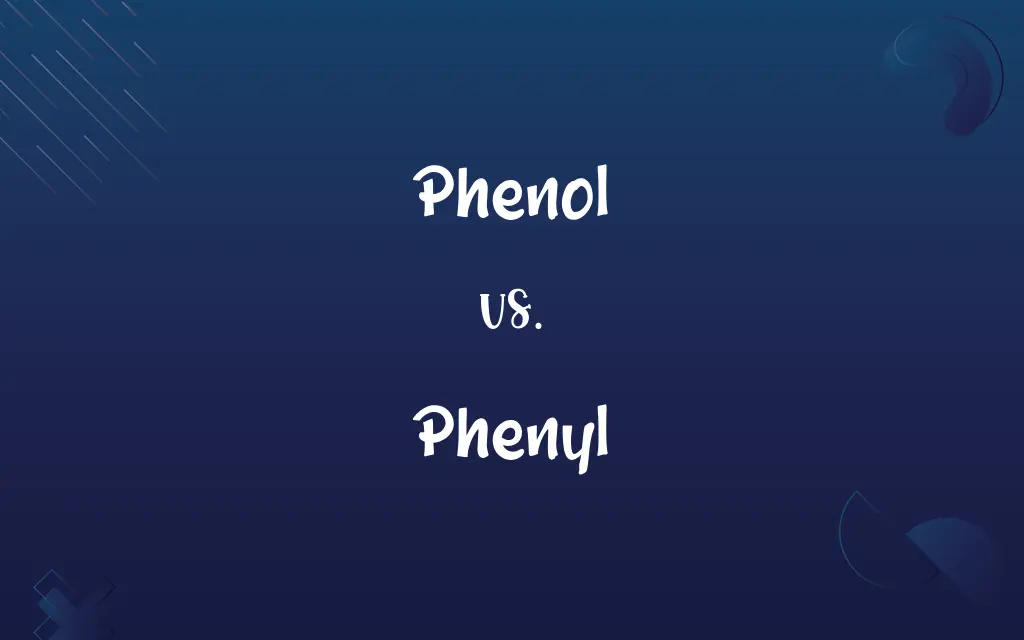Phenol vs. Phenyl: Know the Difference

By Shumaila Saeed || Updated on December 25, 2023
Phenol is a hydroxy derivative of benzene (C6H5OH), while phenyl is a benzene ring minus one hydrogen atom, forming a functional group (C6H5).

Key Differences
Phenol consists of a benzene ring bonded to a hydroxyl group (OH), making it an aromatic compound with distinct properties. Phenyl, however, is a benzene ring minus one hydrogen atom, acting as a functional group attached to other atoms or molecules.
Shumaila Saeed
Dec 06, 2023
Phenol is used as a distinct compound in various industrial and medical applications, known for its antiseptic properties. Phenyl is not a standalone compound but a part of larger molecules, contributing to the properties of the whole molecule.
Shumaila Saeed
Dec 06, 2023
Phenol, due to its hydroxyl group, has acidic properties and can form hydrogen bonds, influencing its solubility and reactivity. Phenyl, as a radical, impacts the reactivity and properties of the compounds it forms part of, like increased rigidity and aromaticity.
Shumaila Saeed
Dec 06, 2023
Phenol is used in the production of plastics, resins, and pharmaceuticals. Phenyl groups are significant in organic chemistry, found in many drugs, dyes, and organic compounds, altering their chemical behavior and physical properties.
Shumaila Saeed
Dec 06, 2023
Comparison Chart
Basic Structure
Benzene ring with a hydroxyl group
Benzene ring as a functional group
Shumaila Saeed
Dec 06, 2023
ADVERTISEMENT
Properties
Acidic, antiseptic, forms hydrogen bonds
Contributes to stability and aromaticity of compounds
Shumaila Saeed
Dec 06, 2023
Typical Uses
Plastics, resins, medical applications
Found in pharmaceuticals, dyes, and other organic compounds
Shumaila Saeed
Dec 06, 2023
Phenol and Phenyl Definitions
Phenol
A compound with a hydroxyl group attached to a benzene ring.
Phenol's chemical structure makes it useful in pharmaceuticals.
Shumaila Saeed
Nov 22, 2023
ADVERTISEMENT
Phenyl
A functional group in organic chemistry.
The phenyl group is a key component in many pharmaceutical drugs.
Shumaila Saeed
Nov 22, 2023
Phenol
A toxic, colorless crystalline solid with antiseptic properties.
Phenol is used as a disinfectant in some throat sprays.
Shumaila Saeed
Nov 22, 2023
Phenyl
A hydrocarbon group derived from benzene by removing one hydrogen.
The phenyl group contributes to the fragrance of certain essential oils.
Shumaila Saeed
Nov 22, 2023
Phenol
An aromatic compound derived from benzene.
Phenol is a key ingredient in the manufacture of some plastics.
Shumaila Saeed
Nov 22, 2023
Phenyl
A benzene ring as part of larger organic molecules.
Phenyl groups are often found in various synthetic polymers.
Shumaila Saeed
Nov 22, 2023
ADVERTISEMENT
Phenol
A substance used in chemical synthesis and as a preservative.
Phenol was historically used to preserve biological specimens.
Shumaila Saeed
Nov 22, 2023
Phenyl
A radical that influences the properties of organic compounds.
The presence of a phenyl group can significantly change a molecule's reactivity.
Shumaila Saeed
Nov 22, 2023
Phenol
A caustic, poisonous, white crystalline compound, C6H6O, derived from benzene and used in resins, plastics, and pharmaceuticals and in dilute form as a disinfectant. Also called carbolic acid.
Shumaila Saeed
Oct 19, 2023
Phenyl
A common structural motif in organic molecules.
The phenyl group is found in many natural and synthetic compounds.
Shumaila Saeed
Nov 22, 2023
Phenol
Any of a class of aromatic organic compounds having at least one hydroxyl group attached directly to the benzene ring.
Shumaila Saeed
Oct 19, 2023
Phenyl
An aromatic hydrocarbon unit, C6H5, that can occur as a substituent in an organic compound or as an ion or radical, structurally related to benzene.
Shumaila Saeed
Oct 19, 2023
Phenol
A caustic, poisonous, white crystalline compound, C6H5OH, derived from benzene and used in resins, plastics, and pharmaceuticals and in dilute form as a disinfectant and antiseptic; once called carbolic acid
Shumaila Saeed
Oct 19, 2023
Phenyl
(organic chemistry) A univalent hydrocarbon radical (C6H5) formally derived from benzene by the removal of a hydrogen atom, and the basis of an immense number of aromatic derivatives.
Shumaila Saeed
Oct 19, 2023
Phenol
Any of a class of aromatic organic compounds having at least one hydroxyl group attached directly to the benzene ring (or other aromatic ring)
Shumaila Saeed
Oct 19, 2023
Phenyl
A hydrocarbon radical (C6H5) regarded as the essential residue of benzene, and the basis of an immense number of aromatic derivatives.
Shumaila Saeed
Oct 19, 2023
Phenol
A white or pinkish crystalline substance, C6H5OH, produced by the destructive distillation of many organic bodies, as wood, coal, etc., and obtained from the heavy oil from coal tar.
Shumaila Saeed
Oct 19, 2023
Phenol
Any one of the series of hydroxyl derivatives of which phenol proper is the type.
Shumaila Saeed
Oct 19, 2023
Phenol
Any of a class of weakly acidic organic compounds; molecule contains one or more hydroxyl groups
Shumaila Saeed
Oct 19, 2023
Phenol
A toxic white soluble crystalline acidic derivative of benzene; used in manufacturing and as a disinfectant and antiseptic; poisonous if taken internally
Shumaila Saeed
Oct 19, 2023
Phenol
An organic compound with mild acidic properties.
In the laboratory, phenol can be used to make certain chemical reactions happen.
Shumaila Saeed
Nov 22, 2023
Repeatedly Asked Queries
What is a phenyl group?
A phenyl group is a benzene ring minus one hydrogen atom, used as a functional group in organic compounds.
Shumaila Saeed
Dec 06, 2023
Are phenol and phenyl interchangeable?
No, they are different; phenol is a compound, while phenyl is a part of larger molecules.
Shumaila Saeed
Dec 06, 2023
What are the uses of phenol?
Phenol is used in making plastics, resins, and in medical applications.
Shumaila Saeed
Dec 06, 2023
What is phenol?
Phenol is a hydroxy derivative of benzene, known for its antiseptic properties.
Shumaila Saeed
Dec 06, 2023
Where is the phenyl group found?
It's found in many organic compounds, including drugs and dyes.
Shumaila Saeed
Dec 06, 2023
Is phenol soluble in water?
Phenol is moderately soluble in water due to its ability to form hydrogen bonds.
Shumaila Saeed
Dec 06, 2023
How is phenol made?
Phenol is typically produced from benzene through chemical processes like the cumene process.
Shumaila Saeed
Dec 06, 2023
Is a phenyl group reactive?
Yes, it can influence the reactivity and properties of the compounds it's part of.
Shumaila Saeed
Dec 06, 2023
Can phenol be used as a disinfectant?
Yes, due to its antiseptic properties.
Shumaila Saeed
Dec 06, 2023
Is phenyl a common group in organic chemistry?
Yes, it's a fundamental group in organic chemistry.
Shumaila Saeed
Dec 06, 2023
How is phenol stored?
Phenol should be stored in a cool, dry place, away from light.
Shumaila Saeed
Dec 06, 2023
Is phenol used in pharmaceuticals?
Yes, it's used in some pharmaceutical products.
Shumaila Saeed
Dec 06, 2023
Is phenol naturally occurring?
Phenol can be found in natural sources but is usually synthesized industrially.
Shumaila Saeed
Dec 06, 2023
Can phenyl form a standalone compound?
No, it's always part of a larger molecule.
Shumaila Saeed
Dec 06, 2023
What type of bond does phenyl form in compounds?
It typically forms covalent bonds in organic compounds.
Shumaila Saeed
Dec 06, 2023
Are phenol fumes toxic?
Yes, phenol vapors can be toxic and irritating to the skin and respiratory system.
Shumaila Saeed
Dec 06, 2023
How does a phenyl group affect a molecule?
It can increase stability and contribute to the aromatic character of the molecule.
Shumaila Saeed
Dec 06, 2023
Does the phenyl group have a distinct smell?
Not on its own; however, it contributes to the aroma of compounds it's part of.
Shumaila Saeed
Dec 06, 2023
What properties does a phenyl group impart to a molecule?
It can affect a molecule's reactivity, boiling point, and solubility.
Shumaila Saeed
Dec 06, 2023
Share this page
Link for your blog / website
HTML
Link to share via messenger
About Author
Written by
Shumaila SaeedShumaila Saeed, an expert content creator with 6 years of experience, specializes in distilling complex topics into easily digestible comparisons, shining a light on the nuances that both inform and educate readers with clarity and accuracy.







































































